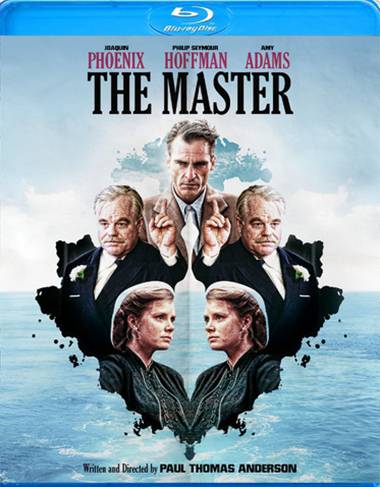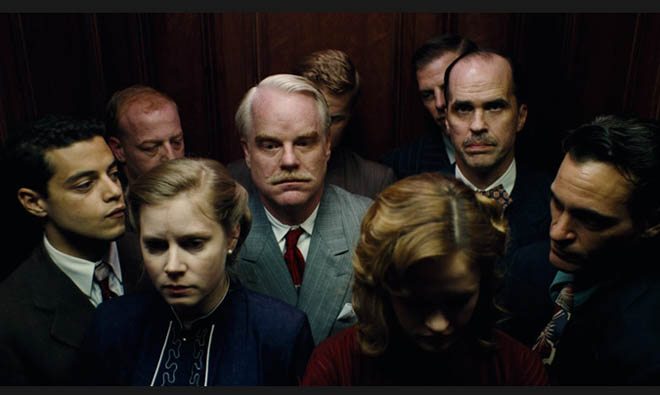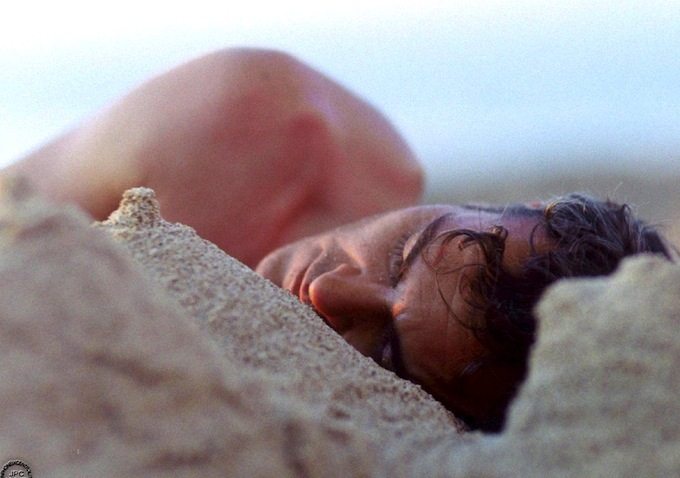The Master Movie Review: Given the massive amount of discussion surrounding The Master at least a year prior to its release, it isn’t a stretch to say that many people had already decided what kind of movie they wanted it to be. When word got out that Paul Thomas Anderson’s follow up to There Will Be Blood would have allusions to L. Ron Hubbard and the Church of Scientology, speculators were expecting the film to be a controversial stab at the Hollywood-centric religion. When the trailers finally started coming out for the film last summer, there was much Oscar talk surrounding the film, with people expecting it to be a shoe-in for best picture. The Master, after seemingly an eternity of waiting, was finally released in theaters last September and the response toward it wasn’t what anyone was expecting, Anderson included. While certainly relative to Scientology in some areas as it’s a film about blind faith, many people seemed shocked that the film focused more on a damaged war veteran rather than a cult leader, and many audience members found the arty narrative to be confounding. It received high honors at the Vienna Film Festival and from professional critics, but it had a fairly divisive reaction to it from audiences and was ultimately denied Oscar nominations for best picture or best director. Now, a good six months after the film had it’s theatrical premiere, The Master has come to DVD, and now perhaps the final verdict on Anderson’s surreal opus will come to light.
The Master is a film set in the 1950s that centers around the indelible character of Freddie Quell, a World War II vet struggling to adapt to post-war society, as he’s most likely suffering from some form of PTSD. Primal towards sex, frequently drunk and easily prone to violence, our protagonist only finds failure in every job he tries his hands in past his duties as a soldier, until he becomes a stowaway on a boat that shines a particularly inviting and brilliant light. Here Freddie meets the ship’s owner and titular character, Lancaster Dodd (Philip Seymour Hoffman), a renowned author who has started his own following known as The Cause. Dodd believes that he has unlocked deep secrets to mankind’s understanding of time and the universe, and it’s also clear that he sees something integral to this system in Freddie. From here on out, we see how these two men (both so different, yet so alike) interact, amidst the back drop of this strange time in U.S. History.
The two facets of The Master that seemed to have received unanimous praise were the film making and the acting, both of which are justifiable. The film is an utter beauty of modern film making, and the decision to shoot in 70 MM adds such a layer to the cinematography. The film’s sweeping imagery and descriptive close-ups recall epics from the time period like Lawrence of Arabia, and the artistic depiction of America harken back to Terrence Malick’s two early masterpieces, Badlands and Days of Heaven. The soundtrack is wonderful in a similar sense too, with composer Johnny Greenwood contributing moving music pieces that evoke dread, fascination and ultimately hope. It’s hard for the small screen to entirely recapture the experience of seeing The Master on the big screen, but the blu-ray dvd does have a mighty video quality to it that captures the lushness of the viscera, although I should warn those that haven’t upgraded from standard definition that the video quality is rather murky for the digital release.
Still, the acting is possibly even more integral for this tapestry than Anderson’s craft. The only Oscar nominations The Master received were for the performances of it’s three leads, one of which is certainly the most impressive performance of the year. Joaquin Phoenix truly is a marvel to behold as Freddie, making the character as much his own creation as the screenplay’s. While there is a repetition to his performance as the character alternates between being violent and calm throughout the film, it’s in the subtle nuances that really make him mesmerize. From a menacing grin, to his stilted appearance that’s only made more visible by the fact that he’s frequently seen holding his sides, viewers can find plenty of cues to understand that this is a man in pain. Philip Seymour Hoffman, while not as unusual in his delivery as Phoenix, is at his able best here as well, given Dodd the voice of charisma, yet a prevailing sense of uncertainty as well. Some have said that there’s a bit of homo-eroticism in the character interactions between Dodd and Freddie, but maybe that’s just because Hoffman and Phoenix act with such fiery passion. Amy Adams gives a very vital performance too as Dodd’s wife Peggy, whose actions and dialogue might suggest that she believes in Dodd’s theories more that he does. Admittedly, the film’s most glaring problem might be that her character can be seen as being underused.
What is The Master about though? So many people seem to be dumb founded by this question, to the point that they even say that the film simply has no plot or meaning to it. Roger Ebert even agreed with this, as his review said the film was “fabulously well-acted and crafted, but when I reach for it, my hand closes on air.” This couldn’t be farther from the case though, as the film does have a traditional arc to it, and its themes are all but blatant. For one, The Master should be taking far more literally than people have been seeing it as. It’s not so much an allegory, but a surreal character study, and period piece. One should pay attention to the allusions the film makes to phenomena of post-war America, such as the desire to feel enlightenment, or the feeling that we were all sexually repressed as a culture. Just take it as it is, don’t try too hard to look into inner meaning or motif. The film is trying to communicate on the fever dream that seemingly gripped an entire nation after the close of a brutal war, and the start of an uncertain future. A theme that resonates especially when you consider that it’s not dissimilar from America’s current predicament.
While the film is certainly chilly as many critics have said, I also feel that many of those same reviewers have been disregarding that there is a real warmth to The Master as well. The disorienting aesthetics definitely match Freddie’s paranoid and aimless state, but all of this subsides in the moments when the character is truly happy. The inklings we see of his past are majestic to say the least, as the flashback sequence of that character’s romance with a young girl is tender and sweet, and really shows a human side to the animalistic Freddie. In interviews Anderson has said he was interested in this time period as many stories at the time involved people trying to reclaim their past(possibly a page taking from The Great Gatsby), something that Freddie has been literally and metaphorically running from for the whole film. Also, the film is very funny too, and I feel that if you miss on the film’s humor than you are doing it a great disservice. Funny faces, ironic gestures, slapstick and even fart jokes are present in The Master, and helps one to find sympathy in these flawed characters. As Lancaster Dodd says while addressing a crowd of believers, “the secret is laughter,” and I feel this is more than just a nudge on Paul Thomas Anderson’s part as a provocateur. Anderson has often been referred to as this generation’s Kubrick as he has always made studio-budgeted films while retaining his auteurship, and I feel The Master is even more supportive of this claim than any of his previous pictures. Like Kubrick before him, he’s made a film that at first glance may appear to be pessimistic, while in reality it’s far more accurate to see the film as being cautiously optimistic. In fact, this might be the first American film since Eyes Wide Shut to make such startling use of dream logic.
The extras included on the DVD prove interesting, although they’re certainly not as insightful as some would hope. Those who noticed that there were numerous scenes in the trailers that were not included in the film will be glad to find that Anderson has found another use for them here. The 20-minute-long outtake and deleted scene montage Back Beyond meshes some highlights that were cut from the film, and edited in a fashion that’s similar to the film’s pace. Also included are the various trailers that were made for the film, as well as a brief look at some behind the scenes footage. All nice touches, but the DVD also sorely lacks a commentary track which I think just about everybody would want for a film like this. Probably the best extra for the DVD (and reserved only for the Blu-ray edition) is the inclusion of the 1946 documentary Let There Be Light. John Huston’s documentary about WWII veterans is cited as an immense influence for The Master by Paul Thomas Anderson, and grants viewers more familiarity with the period that is depicted in the film.
Only time will tell as to what The Master will be looked on in Anderson’s filmography, but in this reviewer’s opinion I feel it will only only grow more reputable with age. In the years ahead where we can remove The Master from it’s expectation as a Scientology parallel, I feel that people will find a far more rewarding experience. Even now The Master shows that Anderson is one of the few working filmmakers to have such an evolving career, starting out with accessible (albeit extremely well crafted) genre films like Boogie Nights, coming to a more subdued transition with his romantic comedy Punch Drunk Love, and now becoming a true arthouse staple who makes dense films that read like the prose of Samuel Beckett. I just find it so maddening that so many people refused to look at The Master as anything other than a messy film with an unclear path, despite admitting it had breathtaking cinematography and performances. Anderson’s film is a masterpiece, a sensation, and a love story for the ages, one just has to have their mind and soul in exactly the right place to see that.




Absolutely dead on. Beautiful, painful, compelling movie
The Master places the viewer on a journey of cinematic beauty. Human drama is this movie’s strength. Wow.